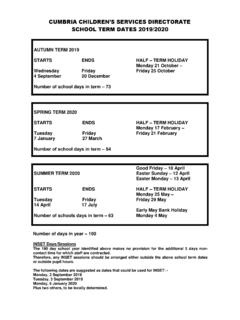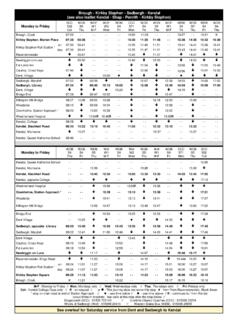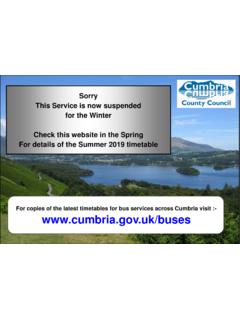Transcription of Early Help Strategy - Cumbria
1 Cumbria Early Help Strategy 2017-2021 September 2017 Vision Early Help in Cumbria develops resilience and independence of families, by supporting them to build on their strengths and encourages them to identify their own solutions and take responsibility for their future and that of their children . What is Early Help In Cumbria Early Help is the umbrella term that describes our continuum of service response based on the needs of families. This includes preventative and universal services through to targeted and edge of care.
2 Early Help is about offering the right help, at the right time, in the right place, by the right person. Early Help is a simple concept: it is about changing our culture from an often late reaction to chronic and acute need and re-focussing our activities, along with our collective partnership, on the root causes of social problems. By doing so, outcomes for families improve and intrusive, costly statutory interventions are avoided. Early Help is about enabling families to have the opportunity to regain control of their circumstances before they escalate into more difficult issues.
3 In Cumbria we will do this by ensuring that we have a joined up Early help system which promotes the identification of emerging needs and earlier intervention and that responds using a whole family approach. Effective Early Help relies upon local agencies working together to: Identify children and families who would benefit from Early help Undertake an assessment of the need for Early help; and Provide a proportionate response to address the assessed needs of a child or young person and their family Collaborate in partnership with families using a strengths based approach evidencing sustainable outcomes In Cumbria we have endorsed the use of district based Early Help & Family Support Panels for those cases where professionals are concerned about the delivery of the plan or are unable to identify an appropriate co-ordinator.
4 National context The role of Early Help to enable children , young people and families to reach their full potential has been a common theme in a number of government reviews (Munro, Marmot, Tickell, Allen, Field)1 They have all independently reached the same conclusions on the importance of providing help Early in order to improve outcomes for children and young people, who have needs that range from preventing abuse and neglect to helping parents achieve the aspirations they hold for their children .
5 Nationally there has been a growing interest and understanding of the importance of evidence based Early Help services, with a need to demonstrate the effectiveness of Early Help interventions in reducing the costs associated with specialist and acute services. There is common acceptance that Early Help may not be a quick fix but a sophisticated, highly targeted process and approach with specific measurable outcomes. Working Together to Safeguard children 2015 outlines that it is the responsibility of all practitioners working with children and young people to safeguard and promote their welfare and understand the criteria for taking action across a continuum of need, including Early Help.
6 Providing Early help is more effective in promoting the welfare of children than reacting later. Early help means providing support as soon as a problem emerges, at any point in a child s life, from the foundation years through to the teenage years. Working Together 2015 Local Context In Cumbria we are ready to renew our focus and alignment of services to better meet the changing context within which all partners are working. A number of drivers for change have emerged that require a revised Early Help Strategy that will take us through the next four years transforming our systems, these are.
7 Needs of children and our evolving understanding of what works in Cumbria for children and young people Commissioning opportunities and priorities based on needs analysis and JSNA Defining new ways of working through the implementation of Signs of Safety Adopting a whole family approach across children and Adult services Financial pressures and reduced resourcing levels across all partner agencies Changes in the commissioning of Health Services Government focus on Troubled Families and outcomes 1 Eileen Munro Munro review of Child Protection a child centred system May 2011.
8 Sir Michael Marmot Fair Society, Healthy Lives, The Marmot Review 2010 Graham Allen Early Intervention: The next steps 2011 Dame Clare Tickell The Early Years: Foundations for life, health and learning 2011 Frank Field The foundation years: Preventing poor children becoming poor adults 2010 A shared LSCB partnership commitment to work across services to build resilient communities A refreshed Strategy for children and families will enable a proportionate response to emerging needs and therefore children and families will feel empowered and supported.
9 We will see families building resilience, achieving sustainable outcomes and avoiding statutory interventions. We believe that this Strategy will also enable an evidence base of what works in order to ensure effective return on investment. The below diagram evidences the context of Cumbria , in which we need to deliver the Early Help Offer This diagram depicts Cumbria children and young people scaled down to 100. The statistics demonstrate that children and young people requiring an Early help response far outweigh those requiring a statutory social work service.
10 For example fifteen of the one hundred children live in a low income family, eleven are persistently absent from school, nine have a mental health problem and five 16-17 year olds are not in education, employment or training. This clearly evidences the areas of need that require an effective Early Help Strategy to ensure help and support is received at an Early stage to avoid escalation to intrusive and costly statutory interventions. Principles of Early Help Early Help means identifying needs within families Early , and providing preventative support and intervention before problems become complex and entrenched Early Help means supporting children , families and communities to further develop their networks within communities, recognising that individuals.









